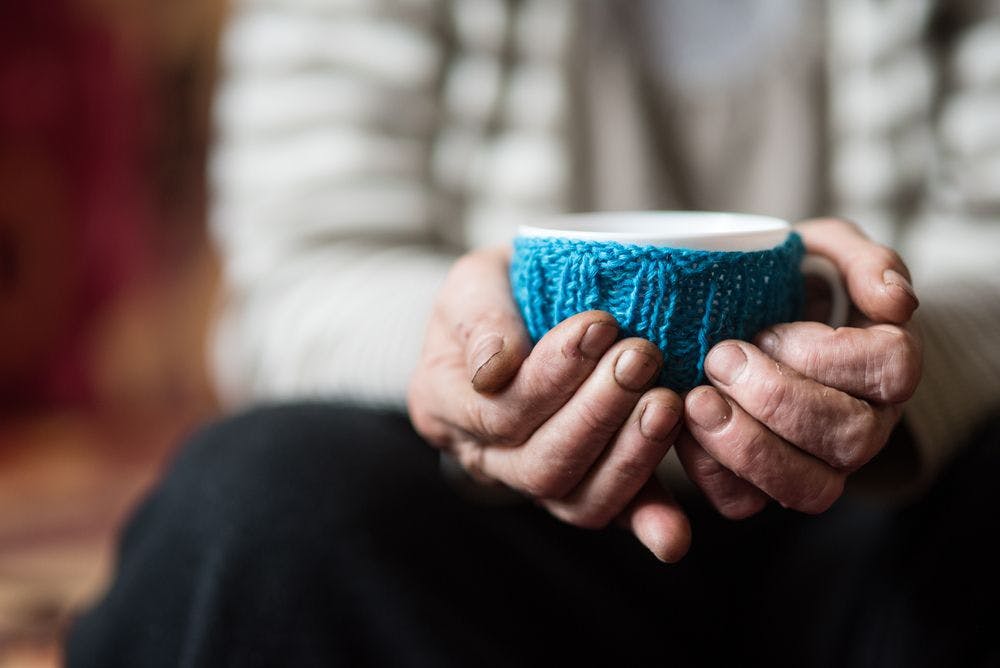The UK's Cost Of Living Crisis: How to Support Your Elderly Loved Ones During the Winter Months

Estimated Reading Time: 8 minutes
With the rising cost of living and the continuing energy crisis, it’s no surprise many of us are feeling the impact of surging prices across all areas of our lives.
New research has revealed that with the colder months approaching, more older adults than ever before are struggling to keep up with an increase in energy, utility and food prices.
Arrange care at home
Browse the best home care in your area.
What Is The Cost Of Living Crisis?
The cost of living crisis is a phenomenon we are seeing across the UK - where the cost of everyday essentials, such as food, utilities and bills are increasing faster than the average income.
For those on limited fixed incomes the cost of living crisis can cause increased worries and concerns. We’re already seeing 40% of adults on lower or fixed incomes significantly reducing their weekly spending on food and groceries - and this is expected to increase further as the cost of living crisis continues.
How Will Rising Energy Costs Impact the Elderly Community?
It’s natural to feel stressed and anxious about the rising energy costs, as it will impact everyone. The ongoing energy crisis – coupled with increased living costs – places a huge strain on the elderly community. So it’s no surprise that the elderly community has turned to Google for support during this worrying time.
Research from the ONS has also revealed that as the cost of living crisis continues, 6 in 10 adults are taking action to reduce their spending on food, fuel and utilities.
There’s a risk that these rising living costs will cause the elderly community to become even more isolated. Social isolation and loneliness can have a devastating effect on our physical health and wellbeing, leading to higher levels of stress, a weakened immune system and increased feelings of depression.
So, it’s more important than ever to check in on our elderly relatives and neighbours; and where possible, offer practical support to those in need.
New research has revealed more older adults have been turning to Google for support with the rising costs of living:
| Search Term | How Much More are People Searching For It? |
|---|---|
| ’Do all pensioners get winter fuel allowance’ | + 174% |
| ’Pension cost of living’ | + 1,600% |
| ’Heating allowance for pensioners’ | + 175% |
| ’Winter payment for pensioners’ | + 126% |
| ’Pensioner energy bills’ | + 25% |
Source: Internal analysis from Google's Keyword Planner over the last 12 months (November 2021-December 2022)
These search results, coupled with the ONS data, are extremely concerning to see. It’s clear that the cost of living crisis is having a significant impact on people across the country, especially the older generations and those within the care sector. It’s more important than ever before that older adults and people in vulnerable positions can access the necessary levels of support during the winter months.
What Impact Will the Rising Cost of Living Have On the Care Sector?
From financial worries experienced by care sector workers to keeping up with the high energy costs of running a care home, the care sector is feeling the impacts of the rising cost of living and the energy crisis.
With a new energy price cap released by Ofgem, gas and electricity bills are expected to increase by an average of 80% in the winter months. However, care operators are experiencing the brunt of the energy crisis, with their energy bills expected to increase by at least 100%.
Care operators are becoming increasingly concerned about their overall business costs, as we face a winter energy crisis. The rising cost of energy prices and everyday essentials will undoubtedly put extra pressure on homes, including in the following areas:
- Maintaining the building’s interior and exterior
- Staffing
- Providing meals for residents and staff
- Organising activities
The cost of living crisis will impact all areas of the care operators’ business models. The worry about keeping up with the energy crisis within the care sector is a trend that is expected to continue into the winter and beyond, unless there is help from the Government.

Practical Cost Of Living Support For Your Elderly Loved Ones In the Winter Months
Question direct debit increases
With so many households set for a significant increase in the cost of their energy bills, remind your elderly relatives that they can challenge the increased direct debit payment amount with their supplier if they disagree with it. This can be a stressful situation, so offer support to your loved one during this process.
Your first step should be to reach out to their supplier and ask them to explain how they calculated the new amount. You can also ask them to share the meter readings they based their calculations on, to see if they match your own meter readings.
Focus on sustainability
From energy-efficient appliances and lighting to maintaining ideal room temperatures, taking the necessary steps to become a greener business will also help to reduce energy consumption and overall energy costs.
Energy-efficient lighting helps lower electricity bills and carbon dioxide emissions, all without reducing the quality of light in your home. Making the right choice on appliances can save you lots of money and also lower your carbon footprint.
Keep up to date with home maintenance
Not only will staying on top of leaks improve the health and safety of your home - but it will also reduce your water bills.
Be alert for any signs of leaks in your loved one’s home - a dripping tap can waste the equivalent of half a bath of water a week. Installing a water tap can also help you to track your water usage and monitor any drips or leaks.
Be sure to check out Save Water Save Money. This site can provide you with free water-saving devices - all you have to do is enter your postcode and see what’s available in your area.
Check their meter reading
Providing a regular meter reading means your bill will be based on accurate usage.
Most energy providers give you several ways to can submit your meter readings – you can find these online. Aim to submit a meter reading every 3 months – this will allow the energy supplier to keep any estimated readings close to your actual usage and avoid any energy overestimation that may be included in your energy bills.
Meanwhile, a smart meter can be used to send automatic updates to your’s or your loved one’s energy supplier.

Remember to check-in
We all know how hectic life can feel, especially as we’re now faced with increased living costs.
However, a simple phone call or regular visit to your elderly loved one can make an enormous difference to how they’re feeling. Staying connected reduces feelings of loneliness, while also providing your loved ones with a safe space to open up if they’re struggling.
Talk to others
Looking after an elderly loved one can place a huge strain on your own physical and emotional health.
With this in mind, be kind to yourself and make the time to do the things you enjoy, whether this is meeting friends, heading into the great outdoors or something else.
Seek support together
If you’re worried or concerned about an elderly relative. For instance, if they’re neglecting themselves or are unable to cope with the energy crisis – then it’s important to seek help.
A good starting point is to reach out to your local adult social services where your loved one or elderly neighbour lives. Where possible, try to discuss this with them, as it can ease any worries.
Become familiar with financial support available
With the cost of living increasing, it can be very difficult for those on a fixed or limited income, so it’s important to know what benefits or financial support your elderly loved one is entitled to, as this can help ease any financial worries.
From winter fuel payments, cost of living payments and public transport concessions to pension credit, there’s often plenty of support available from your local authority. Similarly, some local businesses in your area may also offer support for older adults, so be sure to keep an eye out for any discounts or special offers such as subsidised lunch clubs or activities. Activities that involve socialising with others can help your loved one stay connected and involved in a community during the winter months.
Here are some cost of living support schemes your elderly loved one may be entitled to:
1. Winter fuel payment
The winter fuel payment is a government scheme set up to help older adults keep their homes heated in the winter months. It’s an annual tax-free payment and your loved one must be born on or before 25th September 1956 to be eligible.
2. Pensioner cost of living payment
If your elderly loved one is entitled to a winter fuel payment from the Government, they will also be entitled to a pensioner cost of living payment of £300. This is in addition to any additional cost of living support they receive with their benefits and tax credits.
3. Disability cost of living payment
The disability cost of living payment is a £150 lump sum payment. If your loved one receives, Attendance Allowance, disability allowance for adults, adult disability payment (Scotland) or a personal independent payment - they may be eligible for a disability cost of living payment.
Loading FAQs...



